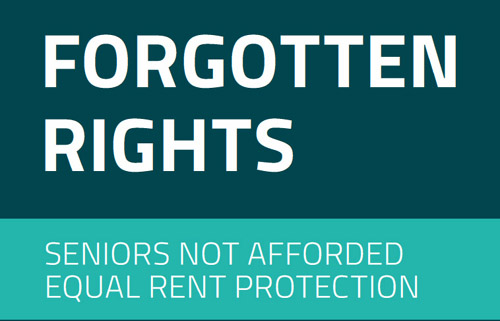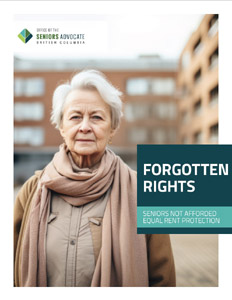
Thursday July 4, 2024 | VICTORIA, BC
by Mary P Brooke | Island Social Trends
The housing crisis in BC has many facets.
Today the BC Seniors Advocate has released recommendations that — if implemented — would see seniors in independent living residences be covered by the same tenancy rights as other renters in BC.
BC Seniors Advocate Dan Levitt pointed out today in his latest report Forgotten Rights – Seniors Not Afforded Equal Rent Protection that the power imbalance between seniors who live in independent living facilities (where meals and other services are optionally provided) leans heavily in favour of the landlords.
Some seniors face eviction if they drop meal services or other supports in order to afford rent increases Levitt points out.
For many seniors, independent living is the bridge between living in their own homes and moving into assisted living or long-term care which offer clinical support.
Landlord costs:
Operators of independent living residences are in most cases following the law as to allowable rent, said Levitt today. He said they are only charging the allowable rent increase for both rent and the service package.
When he hears about operators who charging more: “They’re facing extenuating circumstances that’s why they are increasing by those larger amounts. They have the option for going to the Residential Tenancy Branch and asking for an exemption so they can charge those prices.” said Levitt in his media availability today.
“There is concern in the industry about about the market and returns,” Levitt adds.
“They pay for the investment in those buildings which are very expensive. That’s what the industry is facing. The Residential Tenancy Branch has a process where they can ask for an allowable rent increase that’s greater than what the posted amount is.”
Levitt’s report includes two recommendations:
The government take immediate steps to ensure the Residential Tenancy Branch (RTB) consistently enforces the Residential Tenancy Act (RTA) in recognizing seniors living rental units are covered by the RTA as are any service fees they pay that are a requirement to rent their unit.
The Government review the practices, capacity and expertise of the Residential Tenancy Branch (RTB) to address the issues raised in this report regarding the intimidation and vulnerability many seniors feel when trying to address legitimate residential tenancy issues with both the RTB and landlords.
What is independent living:
It should be noted that the BC Government, Minister of Health, and BC Seniors Advocate all recommend what is referred to as ‘independent living’ but to most people’s understanding that means people living on their own in their own homes in community.
In the context of today’s report, ‘independent living’ refers to seniors who live in retirement residences where a range of services are provided (usually with options).
Today’s report does *not* address the challenges for seniors who are living independently in community as renters.
Images of seniors in OSA reports:
What we refer to as ‘seniors’ in our society can be in a wide range of age cohorts, starting as young as 55 years and reaching over course to 100 and beyond as people live longer in BC.
In the first two reports from the Office of the Seniors Advocate this summer (Ageing Matters – June 5, 2024 and Forgotten Rights – July 4, 2024), the photo images selected for the digital reports pretty much all depict people who are intensely wrinkled and some with implied frailty.
This does not really represent the range of seniors in BC, many of whom are healthy and physically active well into their 70s and 80s.
===== RELATED:
- What did you do for BC Seniors Week? (June 7, 2024)
- BC Seniors advocate sets directions about aging (June 5, 2024)
- New rental supports for BC seniors (April 9, 2024)
- Rethink and embrace aging says new BC Seniors Advocate (January 26, 2024)
- NEWS SECTION: Age & Generations










